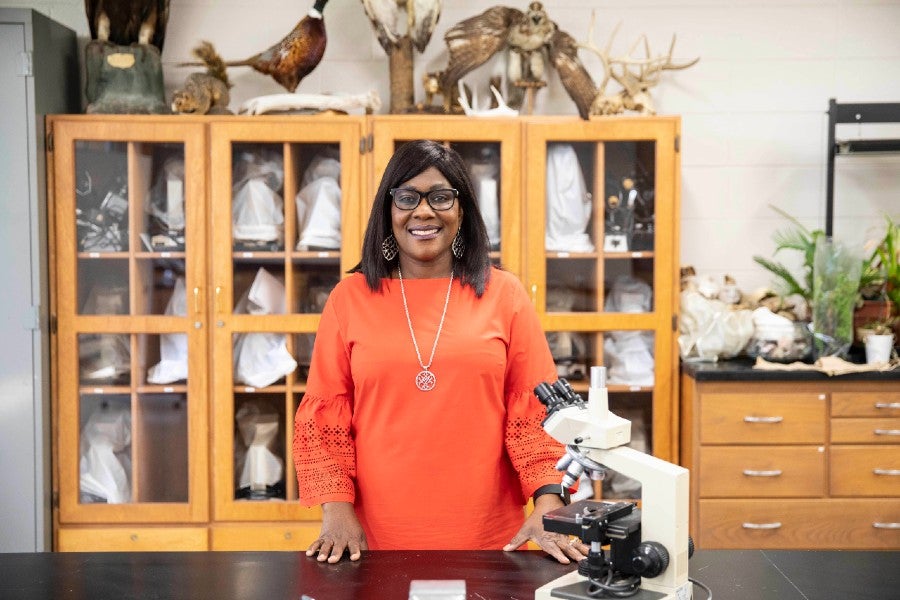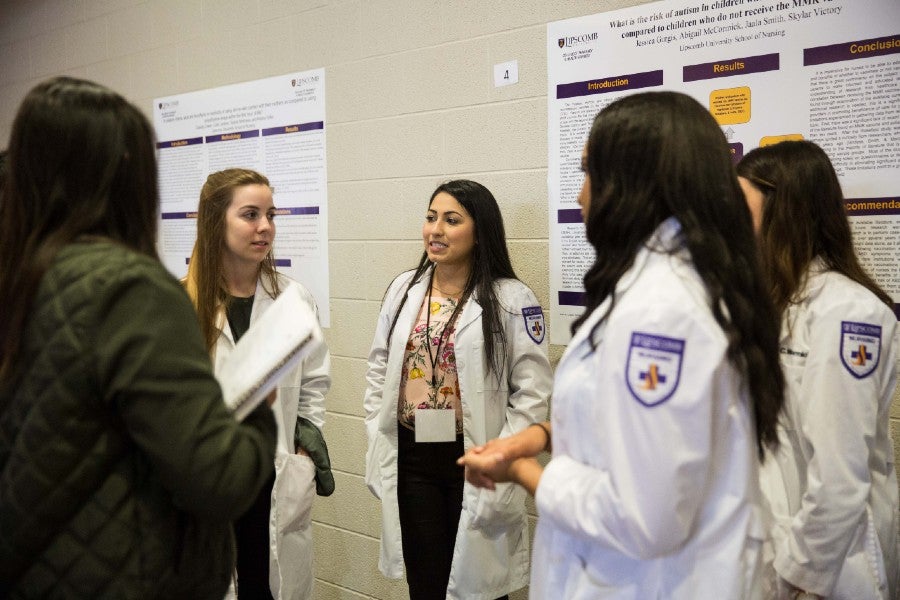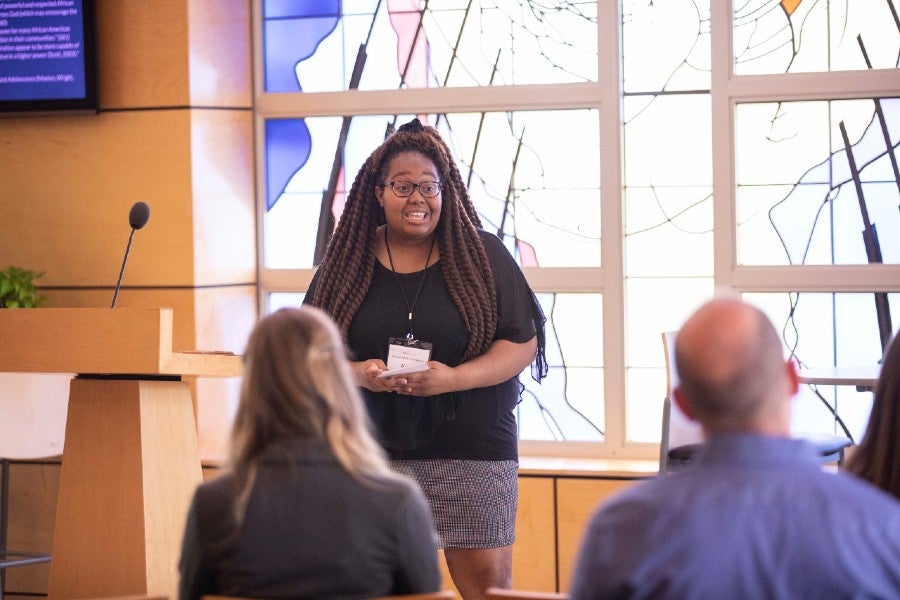Florah Mhlanga led the establishment of Lipscomb’s first student research symposium
Zimbabwe-born quantitative geneticist passionately encourages research among undergraduate students of all colors.
Janel Shoun-Smith | 615.966.7078 |

Note: This story was written in June 2021.
Beginning her life in poverty in Zimbabwe, but with a faith in God and a strong drive to educate herself, Florah Mhlanga grew to become a professor and a researcher who has spent her career pioneering programs at four universities on two continents.
At Lipscomb, Mhlanga serves as an associate dean in the College of Liberal Arts & Sciences and also founded and coordinates the annual Student Scholars Symposium, with more than 300 undergraduate and graduate students participating in its 10th year this past April.
In 1984, Mhlanga became the first in her family to earn a bachelor’s degree, studying animal science at the University of Zimbabwe. She went to work at Zimbabwe’s ministry of agriculture, but soon a former professor suggested she apply for a scholarship for graduate studies at Michigan State University. So by 1988, she was bound for America.
She finished her studies in animal breeding and genetics at Michigan in 1994 and was bound by the terms of her scholarship to work at the University of Zimbabwe. She worked there for eight years, earning tenure as an assistant professor in animal sciences. There she carried out research projects with master’s and Ph.D. students.
Mhlanga also participated in academic research as an undergraduate student at the University of Zimbabwe. Although it was challenging and time-consuming, she believes it was one of her most impactful academic experiences.
“I did not know then that undergraduate research was a high-impact educational practice,” Mhlanga said. “I gained skills that helped me to get admitted into graduate school. Those skills—information literacy, problem solving, and written and oral communication—were essential for my success in my graduate work at a Tier I research institution.”

The Student Scholars Symposium was developed with the ultimate goal of broadening and expanding the participation of students in research.
The Lipscomb Student Scholars Symposium
This experience as a student is what led Mhlanga to spearhead the development of the Student Scholars Symposium at Lipscomb.
“When I finally became a university professor, I was passionate about students engaging in research and creativity especially at the undergraduate level. I wanted them to gain and harness those success skills,” Mhlanga said. “The Student Scholars Symposium was developed with the ultimate goal of broadening and expanding the participation of students and to provide them a venue to showcase their scholarly and creative works in a formal setting.”
The first Symposium took place in March 2012, with just 48 student presenters. Now, more than 300 students from all the academic colleges participate annually.
The symposium has also become an important avenue through which underrepresented students participate in research and creativity, Mhlanga said.
“Now, many students present research results from projects embedded by faculty into their course work. These course-based undergraduate research experiences (CUREs) are now widely promoted in higher education,” says Mhlanga. “In our case, CUREs have shown that students from underserved populations can equally and effectively participate in undergraduate research and creativity. So, in that way, the symposium has broadened undergraduate research to include underrepresented students in the creative process and presentation at the symposium, which is absolutely phenomenal.
“In fact, it is well documented in literature that students of color don’t have the confidence to go to a professor to ask for research opportunities either in the summer or during a regular semester,” Mhlanga said. “But if we involve students in the classroom setting, then all students can participate in the Student Scholars Symposium.”
With the start of Lipscomb’s new African American Studies minor in the College of Liberal Arts & Sciences, Mhlanga hopes to see growth in the diversity of research areas presented at the symposium. An increase in research topics that address diversity equity and inclusion is expected, she said.
“I feel like the Student Scholars Symposium has been a labor of love. Just to see students present so confidently, so professionally, to see them dig deeper into the annals of knowledge and see them become so knowledgeable—as a faculty member, that is what gives me joy,” Mhlanga said. “To see a class working together collaboratively, is amazing to witness. It doesn’t matter the college, department or major, all students come together to support and encourage each other during the symposium.”

The symposium has also become an important avenue through which underrepresented students participate in research and creativity.
Mhlanga’s journey to Lipscomb
Before bringing her drive and creativity to Lipscomb, Mhanga became a department chair at the University of Zimbabwe before coming to America in 2002 with her professor husband Fortune to work in the biology department for five years at Faulkner University in Montgomery, Alabama. The couple then moved on to Abilene Christian University, where she became the first female and the first faculty of color to join the university’s Department of Agriculture and Environmental Sciences.
In Abilene, Mhlanga became heavily involved with developing the animal sciences curriculum, served on the college of arts sciences curriculum committee as well as the institutional research board committee and was a member of the undergraduate research festival committee. There she was involved in research testing therapeutics that could potentially control helminths in goats.
The couple and their two sons, Carl and Craig, came to Lipscomb in 2011 when Florah joined the biology faculty and Fortune became director of the newly established School of Computing & Informatics. Fortune is now the founding dean at the School of Applied Computational Sciences at Meharry Medical College.
The Mhlangas also work in their off hours on humanitarian projects to assist the people of Zimbabwe. They currently work with the Zimbabwean Orphans Program that sponsors orphaned students to access higher education. In fact, through this program the Mhlangas sponsored two orphaned students from Zimbabwe who graduated from Lipscomb University with degrees in computer science in 2018 and 2019, respectively.
During their time at Faulkner, the couple attended Landmark Church of Christ in Montgomery, Alabama, and worked with the church’s first mission team to help build an orphanage in Zimbabwe.
Focus on undergraduate access to research
As associate dean in the liberal arts and sciences college, Mhlanga still teaches and uses the CURE model in her courses but is not actively carrying out in-lab research projects. She continues to lead the way to encourage undergraduate students to become involved in research. Her vision is for Lipscomb University is to establish its own Office of Student Research, an administrative office that oversees student research.
In service to that goal, Mhlanga serves as the Lipscomb liaison to the National Council of Undergraduate Research (CUR), many institutions of higher education that support undergraduate research and creativity.
In that role, she maintains Lipscomb’s Enhanced CUR membership, serves as a counselor for the CUR’s Division of Undergraduate Research Programs (URP) as of June 2020 and encourages students to present at the National Conference of Undergraduate Research and at the Posters on the Hill event. She has previously taken Lipscomb students to present at the national conference, and last year Lipscomb had its first student present at Posters on the Hill.
Mhlanga also strives to bring a diversity of keynote speakers to the annual Student Scholars Symposium to inspire all students, but especially students of color. In 2017 the speaker was world renowned physicist Dr. James Gates, and in 2021 the speaker was world renowned immunologist, Dr. James Hildreth, the president and CEO of Meharry Medical College.
“I have no doubt, Lipscomb is poised for continued growth in undergraduate research and creativity and for students in all majors that we offer at Lipscomb,” she said.